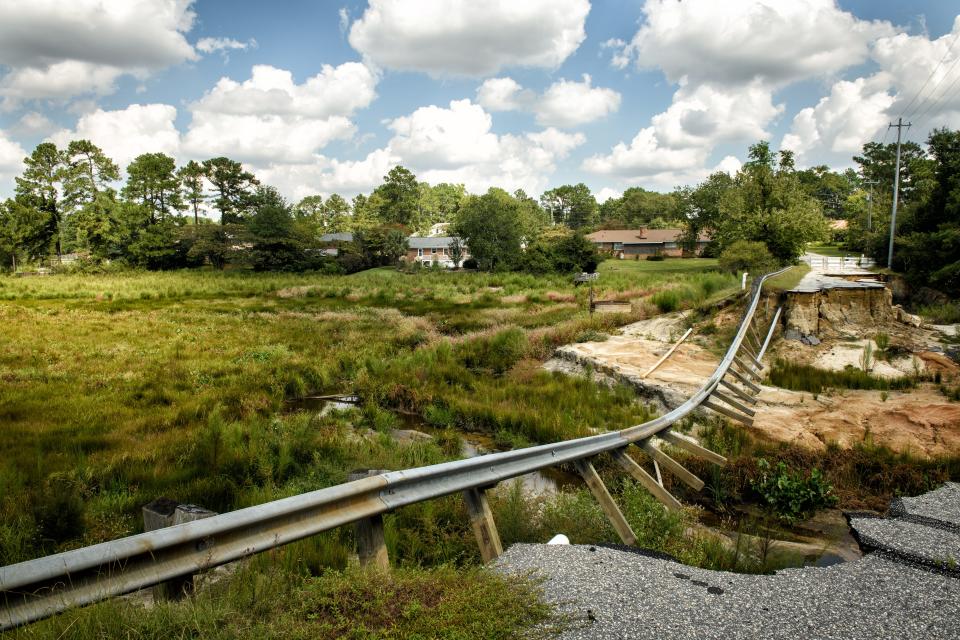What happened to Fayetteville homeowners' lawsuit against the city for hurricane dam damage?
Nearly seven years after Hurricane Matthew tore through Cumberland County, the case of four local homeowners associations that allege the city of Fayetteville was responsible for serious damage to their neighborhood dams during the storm was shut down by a Cumberland County judge.
According to court documents, Cumberland County Superior Court Judge William Pittman dismissed all claims against the city on March 10 after a Feb. 13 hearing. The suit was first filed in federal court in June 2018 and was refiled in Cumberland County in September 2022 after a federal judge dismissed the suit. Raleigh lawyers Matthew Van Horn and William "Woody" Webb Jr. filed a notice of intent to appeal to the North Carolina Court of Appeals on April 7 on the plaintiffs’ behalf.

The lawsuit centers around the homeowners associations for the neighborhoods of Strickland Bridge Road, Arran Lake, Devonwood-Loch Lomond Lake and Rayconda, which saw substantial damage to their respective dams and lakes in the wake of Hurricane Matthew. The owners of four properties in those neighborhoods are also a part of the suit.
The homeowners and their associations allege that the city took advantage of easements granted to it over the past 30 years allowing city access to the dams and lakes, according to the lawsuit. After allegedly failing to maintain or upgrade the dams for years, all four overtopped during Matthew, damaging three of the four dams beyond use and exposing the lakebeds there, the suit states.
Federal beginnings
The lawsuit was filed federally on June 8, 2018, with the HOAs and the individual homeowners suing the city of Fayetteville and the Fayetteville Public Works Commission, also known as the PWC, according to court documents.
The original complaint shows the federal lawsuit requested the following:
A monetary judgment against the city and PWC for damages equal to the amount of property value lost because of the damage to the dams.
Money for the cost of repairing any properties, dams, lakes and any other areas damaged by the city and PWC.
An order eliminating or modifying easements granted to the city in the affected areas.
Compensation for attorneys’ fees.
An order instructing the city and PWC “to create an oversight plan to manage and maintain the property with respect to the ability to retain stormwater.”
The suit alleged that over the past three decades, the city and PWC failed to properly maintain and upgrade the involved dams, leading to damage during Hurricane Matthew. The suit also claimed that the city had failed to properly compensate the plaintiffs for the use of their property to move and store excessive amounts of stormwater, according to the complaint.
“The existing City of Fayetteville stormwater drainage system is undersized, antiquated and, in fact, decrepit,” the suit states.
The complaint also laid out a timeline of when different easements were granted to the city, with the earliest easement dating back to 1988.
“Over the course of 30 years, the Defendants neglected, ignored, and disregarded the condition of the easements, failing to maintain, manage, oversee, or upgrade the easements while the City dumped and stored the City’s stormwater in public use properties,” the complaint alleges. “Instead, the City utilized the Plaintiffs’ private property along with the City’s easements to take the Plaintiffs’ property for a public use.”
PWC was dismissed from the lawsuit on Aug. 15, 2019, and on Sept. 15, 2020, the city of Fayetteville motioned for a judgment without a trial — a motion granted by U.S. District Judge James C. Dever III, who ruled that no federal claims existed and dismissed the alleged violations of state laws so they could be heard in the county court.
Why the dismissal?
In his Aug. 6, 2021, judgment, Dever ruled that the HOAs and individual homeowners failed to provide any proof that the city was responsible for the damage to the dams, citing a study conducted for the city by Raleigh-based engineering firm Freese and Nichols.
“The models showed that all four dams would have overtopped in 1996 or 2005 even if no urbanization had occurred between annexation and 2016,” Dever said.
The plaintiffs had argued that Fayetteville’s growth led to excessive demands on the stormwater system, which overtaxed the dams.
Dever ruled that the Freese and Nichols models also showed the dams did not meet minimum engineering standards when they were annexed by the city.
“The models showed that the increase in stormwater generated in the water basins above the dams between annexation and 2016 was negligible and that the majority of stormwater runoff due to urbanization occurred between when City annexed the four properties,” Dever stated.
Dever found that the HOAs associations and homeowners failed to investigate how the dams would have fared during the hurricane if not managed by the city.
“Even viewing the record in the light most favorable to plaintiffs, plaintiffs cannot show that these alleged violations proximately caused their property damage,” Dever said in his ruling.
Next steps
Pittman’s order did not state why he dismissed the plaintiffs’ claims in Cumberland County Superior Court, but in its motions to dismiss, the city laid out similar reasoning as Dever’s order, arguing that the homeowners and homeowners’ associations could not link the city’s use of the dams to the damage they sustained during Hurricane Matthew.
Webb Jr. said last month that he and Van Horn are working to file an appeal with the North Carolina Court of Appeals.
Government watchdog reporter Lexi Solomon can be reached at ABSolomon@gannett.com.
This article originally appeared on The Fayetteville Observer: Fayetteville homeowners' claims against city in dam lawsuit dismissed

